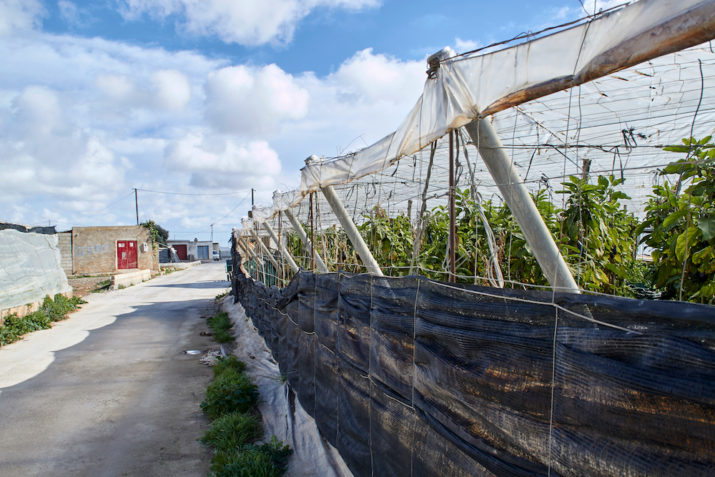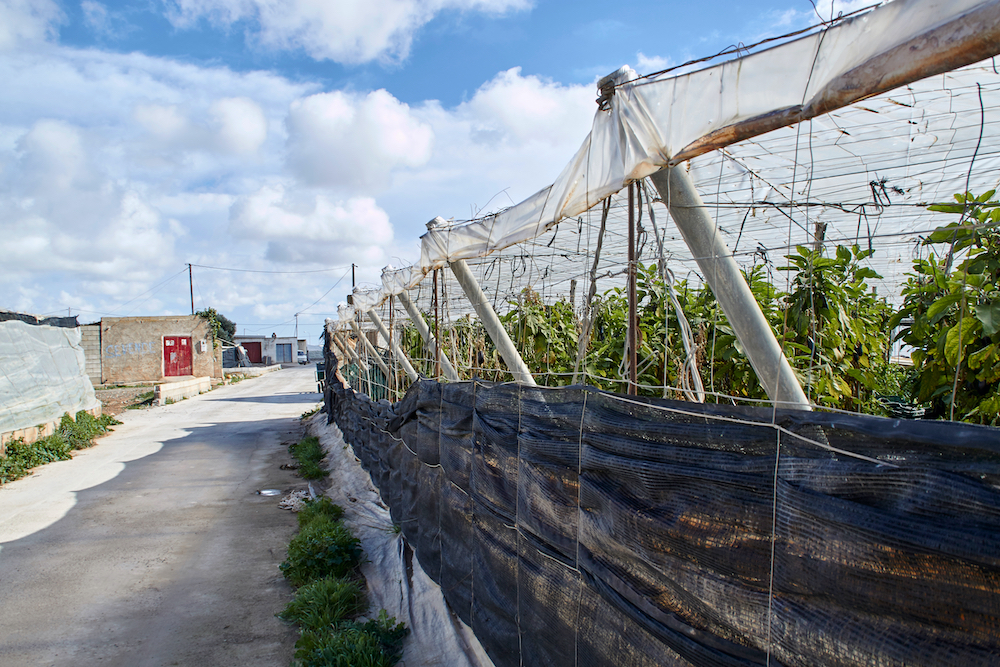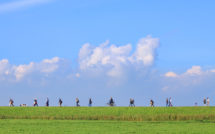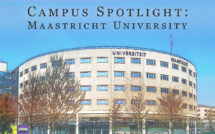

This is part of our special feature on Rurality in Europe.
“Date el gusto”
On a cool evening in early March 2019, a small group of women of diverse ages and ethnic backgrounds began filing out onto the sidewalk in front of the Municipal Information Center of Women in El Ejido, Spain. Exhausted from several hours of being tightly squeezed into a windowless all-purpose room watching an out of focus PowerPoint presentation on how to secure a food handling license (carnet de manipulador de alimentos)—a required certification for working in the large vegetable packing plants ubiquitous throughout the region—no one wasted time with perfunctory goodbyes. As our group quickly thinned, scurrying down the various orange-lit side streets, I turned toward home. I walked with Samira, a young Moroccan woman I had befriended several weeks before and lived a few buildings down on my street. Samira had only recently come to El Ejido from Morocco and was living with her uncle while taking beginning Spanish language classes. Like many of the working-class women of the region both migrant and native alike, she was seeking work as a vegetable packer and even planned to take the fork-lift certification class, one of the best paying positions in the packing plants typically reserved for men. Samira was at first confused and a bit incredulous as to why an American woman was interested in such a class and had come to a remote agro-town like El Ejido, a common refrain. She had originally pegged me for a Russian, a nationality, like Moroccan, that is common among El Ejido’s ethnically-divided neighborhoods, particularly women. Bored, if not downright disappointed to learn of my anthropological interest in the region, she used our walks to practice her favorite Anglicisms memorized from the latest garish export of American pop music.
“Here, put this in your thesis!” Samira yelled out, beckoning me from several paces behind and waving a flyer she had taken from behind the wiper blade of a parked car. It was an advertisement for happy hour at one of El Ejido’s many private “clubs” located on the outskirts of town, thinly disguised brothels that cater to an exclusively male audience. Grasping the sheet, I recognized the insignia as the same one that hung above the huge multistory concrete warehouse situated several blocks behind my building in a part of town that had clearly been zoned for industrial use, squeezed as it was in-between various auto glass, welding and greenhouse supply units. I wondered at the oddity of a town in which radio commercials for aestheticians specializing in hymenoplasty were followed by advertisements for mega-brothels and organic manure, as Samira balked at my sarcastic suggestion we go see for ourselves what “Jueves Locos” (crazy Thursdays) entailed. Looking down at the flyer I was greeted by the silhouette of a woman bending over backward while gripping a pole; a lemon peel splashes into a cocktail glass causing it to gush over the sides where “open 24 hours” appears in English. At the center a young blonde ponytailed girl with computer-accentuated blue eyes and an open gaping mouth outlined in hot pink lipstick stares back in a look of shock. “5€” has been stamped across her forehead. “¡Date el gusto!” it reads in big red letters. Treat yourself.
Rural backlash
A glance at recent strikes and the growing unrest brewing among southern European farmers, squeezed between falling prices and heightened competition from non-EU member states, makes clear that the ties that bind town and country in an era of global food contain deep political implications for farming communities.[1] Relationships that long defined the livelihood strategies for those involved with agricultural production—access to land and family labor, pluriactive households, dependency on inputs, autonomy, dignity, subsistence, and control over the means to reproduce themselves across generations—are now pervasive themes in other non-agrarian sectors of Europe that have witnessed an increase in precarization in response to austerity. New populist discourse has provided the political expression for a growing number of disenchanted Europeans suspicious of political parties, unions, and state structures unable to guarantee access to dwindling social resources. In Spain, a country heralded for its “exceptional” record of keeping far-right populism to the fringe of electoral politics over the past decade, new political subjectivities have emerged in the peripheralized hinterlands. These extend beyond the Republican–or popular democratic–populist movements that have dominated the political arena of Spain’s major cities, giving voice to a far-right populism that has been incubating in the Spanish countryside for some time.[2]
Framed as an ideological and temporal “return,” support for authoritarian populism in Spain has resurfaced, bubbling up from the subterranean crevices to which it had been relegated following the death of Franco in 1975. Bolstered by the twin flames of ultra-nationalist and anti-immigrant rhetoric, these movements have likewise adopted an explicitly antifeminist platform as one of their defining ideological pillars. Seeking to dismantle what they maintain is a radical misappropriation of the concept of woman by an ideological minority of radical feminists, these movements claim to represent the majority of women—a constituency frequently collapsed in speeches and pamphlets into “parents.” Nostalgia for lost femininity and traditional gender roles are red meat for far-right supporters railing against “feminist supremacism,” whose central tenets they argue fuel a repressive “gender ideology” that unfairly allocates state funds for discrimination against men. “After all,” I was told on more than one occasion “violence has no gender.”
As support for a backlash of authoritarian measures against feminist victories grows in rural areas, the political stakes for a revived exploration of the relationship between city and country have never been higher. Below, I make the case for a relational approach to rurality. I ask how the growth of far-right populism, so relevant to Spain’s political future, has managed to fly under the radar for so long. I then return to El Ejido, the field site where I have carried out ethnographic research since 2015. In the past two years, El Ejido has come to be known as ground zero for Vox, a neofascist political party that emerged in December 2018 after a decisive victory in Andalusia’s parliamentary elections. This surprising victory precipitated an even bigger series of electoral gains at the national and European Parliamentary elections in 2019. I explore how the Spanish far-right draws on moral idioms of “equality” to muster support for women’s erasure, a phenomenon I refer to as egalitarian antifeminism. These efforts to frame feminism as an orchestrated attack on equality often borrow from English that equate feminist struggle to fascist take-over, including earnest reference to “feminazis.” This curious reversal, I argue, is best understood dialectically as a counter-movement and links to wider antifeminist politics on the rise globally.
Spanish ruralities in the age of austerity (or, how did we miss this?)
At the close of 2020, authoritarian populism has emerged fully-fledged from rural spaces long ignored as “empty” and out-of-fashion within European academe.[3] Oriented around emotions—the visceral feeling of lost dignity, material precariousness, and dwindling access to social resources—the far-right has tapped into a reserve of suspicion and betrayal that has long defined Spanish rural inhabitants’ attitudes toward cosmopolitan centers. A recurrent theme throughout Spain’s fraught history between peasants and agrarian land regimes, this suspicion reflects painful legacies of dispossession and differentiation that have shaped how rural people locate themselves and their neighbors within intersecting structures of social class, political identification, gender regimes, and shared ideas of deservedness and value.
Despite some early warnings from anthropologists working within the framework of global political economy, recent scholarship on rural areas in Spain does little to explain how views once relegated to the far-right fringe of Spanish politics now represent the third largest political force in the country. Moreover, how did studies of rurality and agrarian change petrify as a passé area of research in an era of industrialized agri-food supply chains? And likewise, why have new efforts to discredit and demoralize feminist struggle gained traction in rural areas that heavily rely upon women’s paid and unpaid labor in agricultural production and household reproduction to weather the deleterious effects of structural adjustment?
Several relevant factors are worth mentioning. First, following the establishment and subsequent enlargement of the European Union, massive segments of the southern European peasantry found themselves repositioned practically overnight within a new imagined community of Europe linked by access to a free market and an ethos of shared citizenship.[4] Second, alternatives to capitalism and transformational politics that had bolstered widescale anti-imperialist struggles throughout the 1960s and 1970s were on the decline following the ascendency of neoliberalism in the mid-1980s. In academia, a growing pessimism emanating from postmodernism cast suspicion over broadscale explanatory and comparative frameworks, as systemic inquiry was replaced by semiotics, discursive analysis, standpoint epistemology, and a preference for synchronic small-scale studies. No longer equipped to make normative claims about historical transformation or social conflict, fields like anthropology were largely reduced to ethnographic description of what interlocutors think about their surroundings.[5] For scholars of rurality, this oscillation coincided with the decline of peasant studies, as the erasure of class dynamics foreclosed inquiry on the revolutionary potential and political disposition of European peasantries.[6] Likewise, many scholars in this era were anxious to produce work that appeared socially relevant and reflective of the challenges confronting European integration; studies on multiculturalism, immigration and citizenship tipped research agendas from the outmoded countryside toward modern urban landscapes.[7]
Recently, the Spanish far-right has mobilized support around a defense of national unity against separatist movements in autonomous communities such as Catalonia, and the mediating role of transnational institutions, such as the European Union. Moreover, threats to state sovereignty also take shape as alien ideologies emanating from beyond the territorial border of the nation. In this regard, Vox’s framing of the imperiled patriarchal family—silenced by totalitarian “gender ideology” enforced upon good patriotic families—serves as a microcosm for the imperiled nation. As trust in the governing institutions of the nation-state dwindles, new processes of ethnic fragmentation have emerged to justify or restrict access to diminishing state resources. As states are no longer capable of guaranteeing protections or secure livelihoods to their citizens, former national working-class populations are demoted to the status of ethnic groups, and forced to rub shoulders in unequal co-existence with immigrants and regional minorities. Moreover, these transformations of technocratic governance have produced deep cleavages between a “borderless,” multicultural cosmopolitan governing elite—those intellectuals, experts, political and media professionals charged with producing the discourse by which difference is purportedly represented—and the “dangerous classes” below, still firmly anchored to their national identity.[8]
Some of the worst effects of the 2008 economic crisis were experienced in those southern European countries that received austerity packages from the infamous “Troika” as the aspirational middle-classes were forced to cope with the embittering defeat of downward mobility and diminished standards of consumption and social prestige. While much of the recent discussion on austerity in southern Europe assumes middle classes as the central protagonist in an unprecedented attack against social welfare writ large, a broader examination of austerity—its parallel examples of structural adjustment taken from cases beyond Europe—reveal it to be a global phenomenon with a much longer history, one that aims to “change social formations and re-evaluate the worth of people’s lives.”[9]
From this broader perspective, austerity appears as structural adjustment’s inevitable European homecoming, recalibrating value in the wake of economic, social, and cultural dispossessions that have fragmented working class solidarity and alienated individuals from earlier mechanisms by which collective advancements were won. In the years immediately following the implementation of austerity in Spain, efforts to combat cuts to social welfare were first taken up by the emergent politics of the indignados, a coalition of social movements that drew inspiration less from the language of class and exploitation used in earlier social movements, and more from a position of moral outrage that rallied around slogans of “justice” and “dignity.”[10] Podemos emerged in this context as a new political party of the discontented and has dominated major cities in Spain. More recently, the Spanish far-right has also sought to harness populist disenchantment with electoral politics. They have now found their footing, winning wide voter support in rural areas of Andalusia, where the structural violence of industrial agriculture and seasonal labor migration sits in tension with the descendants of Andalusia’s primitive rebels-turned-agro-entrepreneurs.
Egalitarian antifeminism in the Plastic Sea
Along the far southeastern coast of Andalusia in the province of Almería, a coastal highway stretches across el Campo de Dalías, a dry desert valley where the rugged mountain range of the Sierra de Gádor softly slopes downward before dropping off into the shining Mediterranean. Known colloquially as “el Poniente” after the westerly Mediterranean wind, this region of Almería has undergone rapid transformations in economic growth, physical landscape, and demographics in recent decades. Once known more for its remoteness, El Ejido has moved from the bottom of Spanish economic rankings to one of Iberia’s most sophisticated agricultural systems and now hosts one of Spain’s highest concentrations of transnational migrants.[11]
El Ejido is a study in contradiction and incongruent populations. Located at the geographical, business and political center of el Poniente, El Ejido sits as the crown jewel of el Mar de Plástico (“the Plastic Sea”). Here, intensive greenhouse agriculture dominates the visual landscape with white plastic pitched like a geometric quilt across nearly every available patch of land, at times running up the foothill of a treacherous mountain terrace or the ledge of a precipitous cliff jutting out above the Mediterranean coast. Tucked in-between the greenhouses away from the city center, lies a world of its own laid out in a labyrinth of narrow unmarked dirt roads, where jugs of empty fertilizer float in emerald colored drainage pools next to ramshackle cottages that now serve as dilapidated housing for teams of seasonal farmworkers. In stark contrast, “el Bulevar,” the main artery running through town, features wedding dress shops, real-estate offices and even a Michelin star restaurant on the street above new luxury condos and roof-top cocktail bars. The province’s only Corte Inglés—one of Spain’s large designer department stores typically reserved for posh urban neighborhoods—is located along the palm tree-lined central avenue leading into town, its towering five stories a testament to the economic boom that launched the town into one of Spain’s highest per capita income brackets.
Dating back to the Franco regime’s internal colonization programs, large-scale irrigation projects carried out by Andalusian peasant families from the Alpujarra mountains helped transform this desert region into a lucrative hydroponic dreamscape over the course of a generation. Alongside a massive explosion of wealth, El Ejido has earned notoriety as both a land of financial speculation tied to seaside tourist and housing markets, and the incongruent, largely undocumented, populations from Morocco, sub-Saharan Africa, and Eastern European countries that carry out the cheap, dirty work that allows the region to maintain a competitive edge in the European vegetable trade.
In El Ejido, money talks. Access to cash advances and private credit are visible in the numerous bank branches and farm cooperatives found on any given street corner in town; a bank for every thousand inhabitants. Often described to me in tandem, the high concentration of bank-to-individual ratio is only matched by the high concentration of brothels—Andalusia’s largest—that cater to both older Ejidense farmers, notorious for tales of broken marriages with much younger Russian brides, as well as migrant farmworkers in search of “low cost” options.
The biography of El Ejido’s nouveau riche farmer marks a clear departure from Andalusia’s other more left-leaning provinces, and sheds light on the region’s emergence as a core constituency for authoritarian populism. In contrast to the latifundio system that dominated Andalusian agrarian landownership until the mid-1950s, El Ejido’s rapid deviation from traditional cultures of farming marked a major shift in the relationships between agriculture and nature. New production relations built around access to circulating capital; private indebtedness; increased reliance on industrial inputs; shifts from unpaid family labor in peasant households to highly specialized, agri-business models; and the transition from local to transnational markets have cultivated a moral community that reflects a market society where sharp business sense and risk-taking reign supreme.[12]
Against this backdrop of rugged entrepreneurialism and pride in the “self-made man,” feminism is a surprisingly ubiquitous topic of conversation. In much the same way left populist movements mobilized around slogans of “dignity” in the years immediately following structural adjustment, the far-right has mirrored this strategy, using “equality” as a moral battering ram against violence, while outright denying the gendered aspect of violence. The dialectical relationship between social movements—synonymous with a spirit of progress and liberatory feminist praxis—and countermovement—a conservative reaction to feminist liberation from the authoritarian or patriarchal forces of society—is a useful framework to understand the ideological inversion behind Vox’s claims to moral legitimacy. Perhaps most telling in this regard is the presence of a small but active coalition of women’s associations in El Ejido, who reject Vox’s disingenuous cooption of a term rooted in redistributive aims and pointed me in the direction of the Ministry of Equality’s own statistics on the disproportionate number of deaths women have suffered at the hands of their partners.[13]
In Spain’s polarizing political climate, conservative parties like Partido Popular and the neoliberal Ciudadanos have teamed up with Vox in a clear ideological shift that has undermined an earlier political consensus on the issue of women’s rights. Recently, Vox led efforts to repeal newly minted gender-based violence protection laws from 2004 and is calling for gender-neutral language to replace terms such as “feminicide.” Seeking to remove what they claim is a “discriminatory” allocation of state resources toward women-specific needs, such as funds supporting victims of abuse and the creation of courts specifically assigned to deal with gender-violence, they argue that such laws embolden women to falsely accuse men and fly in the face of equal protection for all Spaniards. In its place, they propose new gender-neutral legislation framed around “intrafamilial violence” aimed to correct the infiltration of “radical feminist organizations” into state power. These organizations, they argue, treat women as perennial victims based on sex while ignoring cases in which women abuse their male partners. They also refer to divorce and child custody hearings, claiming the majority of domestic violence cases are a result of women registering false accusations against their male partners.[14]Alongside these new affronts to domestic violence laws, vocal support for the “natural family” has emerged alongside pro-natalist discourse, materialized in calls for the creation of a Ministry of the Family; an unsettling historical parallel to the triumvirate of political leaders, military officers, and the Roman Catholic Church of the Franco regime.
Rurality, when framed in relational terms, offers more than an interesting ethnographic description of the diversity that occupies the Spanish countryside. It captures how the penetration of international markets under the dictates of local, state, and supra-national governance restructure agricultural livelihoods. In the age of austerity, experiments with how to institute acceptable levels of precarity into people’s lives have uprooted a sense of control that rural people once felt they wielded over their futures. Seen from myopic local perspectives alone, ethnographies of rural life fail to implicate the larger processes of economic change that have situated agro-industrial enclaves like El Ejido within wider histories of enclosure, dispossession, and differentiation. In regards to gender relations, the Spanish far-right is deploying a moral argument for equality to neutralize a topic that is anything but neutral, the exploitative and oppressive means by which women as a class experience violence in their everyday lives.
Victoria Leigh Brown is a PhD Candidate and Richard Antoun Fellow in Anthropology at the State University of New York at Binghamton. She is currently a Lecturer in Binghamton’s Department of Women’s, Gender, and Sexuality Studies and has also taught in the Department of Anthropology at Ithaca College. Trained in political anthropology, her research interests include rural development, labor, feminist theory, health systems and modalities, and contemporary capitalism. In addition to scholarship, her work engages applied dimensions as a community organizer and advocate on a variety of women’s issues. In 2019–20 she was an American Association of University Women Fellow and has been recognized for her advocacy on behalf of social and environmental justice, organized labor, and cancer survivors and their families.
References:
[1] Williams, Raymond. 1975. The Country and the City. New York, NY: Oxford University Press.
[2] Franquesa, Jaume. 2019. “The Vanishing Exception: Republican and Reactionary Specters of Populism in Rural Spain.” The Journal of Peasant Studies 46 (3): 537–60.
[3] MacClancy, Jeremy. 2020. “An Empty Spain Filled with Ideas?” EuropeNow, no. 34. https://www.europenowjournal.org/2020/06/02/an-empty-spain-filled-with-ideas/.
[4] Suárez-Navaz, Liliana. 2004. Rebordering the Mediterranean: Boundaries and Citizenship in Southern Europe. New York, NY: Berghahn Books.
[5] Kalb, Don. 2015. “Introduction: Class and the New Anthropological Holism.” In Anthropologies of Class, edited by James G Carrier and Don Kalb, 1–27. Cambridge: Cambridge University Press.
[6] Narotzky, Susana. 2016. “Where Have All the Peasants Gone?” Annual Review of Anthropology 45: 301–318.
[7] MacClancy, Jeremy, ed. 2015. Alternative Countrysides: Anthropological Approaches to Rural Western Europe Today. Manchester, UK: Manchester University Press.
[8] Friedman, Jonathan. 2015. “Global Systemic Crisis, Class and Its Representations.” In Anthropologies of Class: Power, Practice and Inequality, 183–99. Cambridge: Cambridge University Press.
[9] Rakopoulos, Theodoros, ed. 2018. The Global Life of Austerity: Comparing Beyond Europe. New York and Oxford: Berghahn Books. Also see Knight, Daniel M., and Charles Stewart, eds. 2017. Ethnographies of Austerity: Temporality, Crisis and Affect in Southern Europe. London: Routledge.
[10] Narotzky, Susana. 2016. “Between Inequality and Injustice: Dignity as a Motive for Mobilization During the Crisis.” History and Anthropology27 (1): 74–92.
[11] Martínez Veiga, Ubaldo. 2014. “The Political Economy of El Ejido: Genealogy of the 2000 Conflict.” In Seasonal Workers in Mediterranean Agriculture: The Social Costs of Eating Fresh, edited by Jörg Gertel and Sarah Ruth Sippel, 103–11. London: Routledge.
[12] Martín Díaz, Emma, and Alicia Reigada. 2018. “Intensive Agriculture Under Plastic in Andalusia (Spain): A Production Model in Question.” International Journal of Iberian Studies 31 (3): 183–201.
[13] For statistics see Estadística de Victimas Moratles por Violencia de Género. Delegación del Gobierno contral la Violencia de Género, (accessed August 15, 2020) https://violenciagenero.igualdad.gob.es/violenciaEnCifras/victimasMortales/fichaMujeres/home.htm
[14] Vox. 2018. “100 Medidas para la España Viva.” VOX España. March. (Accessed September 2, 2020) https://www.voxespana.es/biblioteca/espana/2018m/gal_c2d72e181103013447.pdf
Photo: Insight into a plastic greenhouse at El Ejido, Almeria, Spain | Shutterstock
Published on November 10, 2020.




